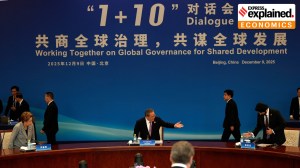MNCs vs Indians issue hots up
NEW DELHI, MAY 13: The Indian industry versus multinationals (MNCs) debate has once again hotted up with the commerce ministry taking str...

NEW DELHI, MAY 13: The Indian industry versus multinationals (MNCs) debate has once again hotted up with the commerce ministry taking strong exception to what they feel is the industry ministry’s attempts to allow complete freedom to MNCs at the cost of Indian firms. A letter written last week by D K Mittal, Joint Secretary in the Commerce Ministry to Ashok Kumar, his counterpart in the Industry Ministry, has asked for an urgent meeting of the Foreign Investment Promotion Board (FIPB) or its Core Group to discuss the matter.
Mittal’s letter, in fact, is the latest in a dialogue where the commerce ministry has objected to what they consider an attempt by the industry ministry to promote MNCs through surreptitious changes in policy. In April, for example, when the industry ministry circulated the minutes of a Core Group meeting held in March, Commerce Secretary P P Prabhu had protested, saying that he had serious reservations about the proposed policy changes. Since Prabhu was part of the Core Group, what hewas saying, politely, was that he felt the industry ministry was taking liberties with what had been agreed to in that meeting. It is, in any case, curious that it should have taken over a month to prepare the minutes of a meeting.
The crux of the debate is whether or not MNCs should be free to set up new ventures in the country if they have existing joint ventures in the same area or if they supply technology to an Indian company in the same line of business. Since several thousand Indian companies would stand to lose their businesses if their technology partners decided to stop supplying know-how and started their own independent ventures, the existing policy doesn’t give MNCs unrestricted freedom — most auto-component suppliers around Delhi, for example, to make parts for the new-generation cars and scooters/motorcycles are critically dependent on foreign technology, and will collapse if this is withdrawn.
According to the current law, any foreign/technical collaborator who wish to set up newventures/tie-ups in India have to provide proof to show this will not jeopardise the interests of the existing technology/trademark collaborator — this is usually done by the Indian firm giving a No Objection Certificate to the proposed venture.
Since several foreign firms, largely Japanese, were keen to be allowed to set up new ventures even if they supplied technology in these areas to Indian firms, the industry ministry decided the matter needed to be reviewed. This is when the Core Group met. The minutes, as they emerged from the Industry Ministry, showed that if the technology agreement was non-exclusive’, the MNCs should be allowed to set up a new venture automatically.
This is what the Commerce Ministry is objecting to. Since most technology-transfer agreements are non-exclusive’ — MNCs have always insisted on this since it leaves them free to sell technology to others — Prabhu argued, a very large number of Indian firms would be affected. Prabhu pointed out that if foreign technology partnerswere allowed complete freedom in setting up competing ventures, they would use this to arm-twist their local partners for more royalty.
Mittal’s letter to Kumar, in fact, cites the example of automotive control-cable company Madhusudan Nippon — a technology collaboration with Nippon Cable System of Japan — where the Japanese partner has got clearance to set up a control-cable venture. Mittal points out that Nippon’s agreement with Madhusudan is till the year 2002. So, if Nippon sets up its independent unit, this could seriously threaten Madhusudan’s business prospects.
The matter has also been taken up by industry associations and FICCI president Sudhir Jalan wrote to Industry Minister Sikandar Bakht last month, saying if MNCs were allowed this freedom, they would cease to take interst in their existing ventures and providing them upgraded technology.
- 01
- 02
- 03
- 04
- 05































